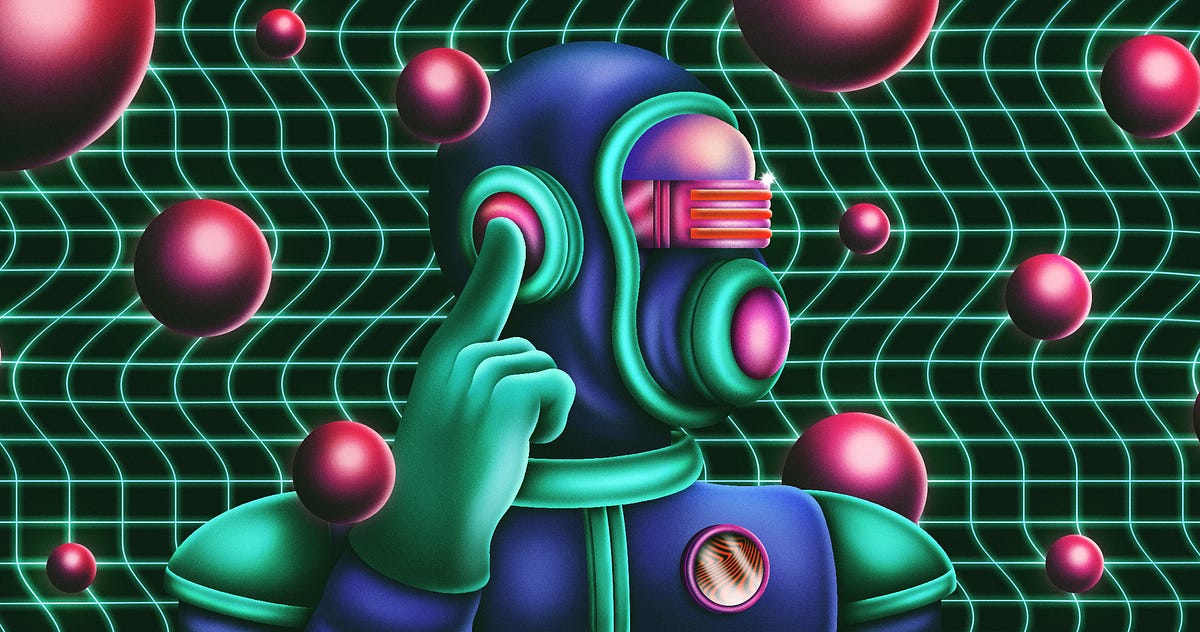A pioneering technologist on how tech should improve mankind, not replace it

 The first thing you learn, working with virtual reality (VR), is that your eyes aren’t much like cameras and your ears aren’t much like microphones. You don’t perceive the world pristinely; instead, you perceive how your personal history, philosophy, culture, and cognitive habits mix with the world out there beyond your head. When people in VR social experiments respond to avatars, for instance, you can measure their racism. But you can also use VR to become more aware of how you perceive anything in the world.
The first thing you learn, working with virtual reality (VR), is that your eyes aren’t much like cameras and your ears aren’t much like microphones. You don’t perceive the world pristinely; instead, you perceive how your personal history, philosophy, culture, and cognitive habits mix with the world out there beyond your head. When people in VR social experiments respond to avatars, for instance, you can measure their racism. But you can also use VR to become more aware of how you perceive anything in the world.
When I put on a VR headset, I don’t just see a glowing digital world around me. I also get another show, because when I flash back through the years, especially to when I was in my twenties, in the 1980s. I remember what a psychedelic feeling it was the first time such a headset gained a color screen; being doubly disoriented the first time I woke up inside VR after attempting an all-nighter; feeling self-conscious being such a huge, unkempt, and hairy creature showing compact, well-mannered Japanese people how to design kitchens in VR when they visited a fancy Tokyo department store.
Some of my happiest memories are of getting apps to work for the first time, like the first surgical simulator; of playing musical instruments inside VR that would have been at home in a Dr. Seuss book. Other memories recall the intense challenges and stresses, like the messy struggle to get the first assembly line for VR headsets going. That happened in the physical world. Why did we even have to go there?
But then there’s another sphere of experience hovering beyond memory. This is a special sense of place that technologists experience — a sensation of being positioned on a cosmic ramp of progress.
 VR was boiling hot again, five or six years ago. Every other young person in San Francisco had a VR studio or startup. It was fun to lay back and not be in the middle of it. Let the kids stay up all night.
VR was boiling hot again, five or six years ago. Every other young person in San Francisco had a VR studio or startup. It was fun to lay back and not be in the middle of it. Let the kids stay up all night.
Tech manias come and go. It wasn’t long ago when I addressed hundreds of young dreamers who cherished their status because they “got” what blockchain was all about, and blockchain was going to change the world. When you’re on the edge of tech, it feels like you’re leaning over the railing of the ship, breaking the ice, and revealing the future. You feel special. You see more.
That privileged, thrill-ride feeling of tech, for better or worse, still exists, and still enthralls, and who am I to say if it was even more intense back in the 1980s? To me, it seems that the feeling used to be even more intense, but maybe that’s an illusion. How can I know what optics distort one’s view from middle age?
It does feel like the ecstasy used to be thicker. This wasn’t just a new trick, or a new market, it was a new WORLD — don’t you get it? It was a new world, in the same way space exploration or psychedelics opened new worlds.
The idea that things were better in the past is almost always a cruel illusion.
What I experience when I put on a VR headset isn’t just a flashback to older memories, but to an older sense of place in history. I remember what it was like to feel certain one was in just the right place, at just the right time, to finally solve mankind’s problems.
You might think that technologists think too much of themselves, especially when young, but you would feel the same way if you took up the discipline. Technologists unambiguously make the future different from the past, irreversibly, and fast enough to have it whack us in the face in our own lifetimes, even when we’re still young. Sure, once in a while, other people can redirect history through politics, war, culture, or ideas — but technologists do it all the time. Someday, if humanity survives, Trump will just be a weird, old, comic, horrible memory, like one of the bad Popes. But we’ll still have selfies.
 Every technologist carries a story, in the back of their mind, about the big arc of history that is being steered by the latest inventions. Steve Jobs used to talk about denting the universe.
Every technologist carries a story, in the back of their mind, about the big arc of history that is being steered by the latest inventions. Steve Jobs used to talk about denting the universe.
These days, the dominant story is one I loathe: The one about how computers and the internet are spawning a new super-brain that will inherit the Earth and the stars, and how people are just a stepping-stone for the glorified new god we are building. That’s what you’ll hear from plenty of tech execs, such as Ray Kurzweil at Google. Many of my young friends who drifted into this sensibility were reading Ayn Rand, while I was watching Star Trek.
When I was young, this gargantuan narrative was already formed, and one of the principal authors also happened to be my kindest mentor, the late, pioneering computer scientist, Marvin Minsky. Long ago, when I was very young indeed, we’d argue about it. I hated it upon first hearing, but boy, was it effective in getting grants. Marvin would tell the tale to the funding agencies and they quickly capitulated. No one wanted to risk being left out of the creation of the new technology that would inherit the world. It’s a narrative that has risen to ever higher planes of influence as its adherents approach the infinite wealth one gains through information supremacy.
I recently was at an event for gifted high school students; they had collaborated on questions to ask me. The first one was, I’m paraphrasing, “If A.I. will surpass humanity soon, and there will be no need for us to do jobs, why did our parents have us? Why are we here?”
It’s the darkest question I’ve ever heard from a young person. It’s based on nonsense. Any program that can be thought of as an A.I. program can also be thought of as just a program people wrote, generally using data stolen from other people to manipulate those other people. If you think that’s too cynical an interpretation, then put the rhetoric aside and look at what A.I. programs are actually being deployed in the real world today.
The argument about the true nature of A.I. is beyond the scope of this piece, but you can read my take on it in my book, You Are Not a Gadget. At any rate, many of us who tended VR’s cradle thought we were launching an alternative to the dreadful nerd eschatology of A.I. and the Singularity. The obvious counter-narrative is that technologists should be creating capabilities in the service of mankind, not to control or replace mankind. But even that seemingly sensible formulation is not so simple when you try to embrace it in practice.
When technologists create more powerful tools for mankind, these tools are often misused. Railroads unquestionably increased human capability, for instance, and yet, in practice, they were often used to effectively monopolize access to areas which were cruelly taken from whoever had been living there before the railroad arrived. Even when we don’t realize there’s a problem with the way we’re using a new technology, we learn more as we go, and sometimes find ourselves invested in destructive patterns. We didn’t know about the link between fossil fuels and climate change until after we had already created a fortress of wealth and influence around fossil fuels.
New tech is always needed to improve upon and fix the old tech.
But in the biggest picture, surely, adding new technologies to the mix creates new options for people, which means more options for decency and kindness. In the bad old days, before antibiotics and covered sewers, infant mortality was astonishingly high. In that context, it was harder to nurture each person born into this world. When I went to school in Mexico as a child, people didn’t treat a baby as being fully born for the first six months, because the odds of survival were still low. Technology creates a context in which we can and must think more compassionately.
If you try to articulate this sensibility, it comes out something like this: Without tech progress, people would have a much higher degree of suffering and no hope of improvement. The idea that things were better in the past is almost always a cruel illusion. The further back you go, the sicker and more miserable were people. Thus, we must push tech.
However, each innovation brings side effects, often due to unwise or corrupt uses. Therefore, new tech is always needed to improve upon and fix the old tech. We can’t go backwards. We have entered into a contract with the future in which we will perpetually fix the mistakes created by previous fixes, and yet overall, in the biggest picture, we will give mankind more comfort, safety, and options to be decent. It’s a clunky but functional picture of an unbounded future.
And yet, and yet… the acceleration of innovation would seem to pull the picture out of focus. If the progress of more and more tech, coming along faster and faster continues, can our compassion possibly get sophisticated quickly enough to keep up? So far, we have avoided nuclear Armageddon, but will we also avoid biotech catastrophe, the decentralized production of cheap personal killer drones, and on and on?
In facing this conundrum, I, and some of the other early VR-heads, came up with a different way to think about the cosmic ramp of progress.
To us, the ultimate problem of the human situation seemed to be: boredom. We had the young hackers’ version of attention deficit disorder and we projected our complaint onto everyone else. If only humanity had something creative and compelling to do, we imagined, something that made conflict boring in comparison. That’s what would “fix” people so that they didn’t keep on taking what ought to be earthly paradise and turning into hell over and over.
From this perspective, humanity exists in a perpetual collective toddlerhood, the terrible twos multiplied by billions. Human rage comes to the fore whenever the latest fascinating distraction dwindles. Therefore, one of the technologist’s duties, beyond extending safety, health, and comfort, is to prepare an infinite train of new fascinations: The Wild West, space travel, virtual reality.
I formed this sensibility early on, as a child. Messaging about the space program in the 1960s often invoked the Wild West. We were told we needed a new frontier to have a healthy society. I loved Star Trek, which portrayed space exploration that way. The Earth of the future was peaceful, but earthlings were out there kicking Klingon butt. The original Star Trek looks oppressively hokey and small-minded to me now, especially the fist fights and women who only serve the most clichéd male imagination, but when I was a kid, it felt like liberation. Space would never run out, and it was filled with spectacular alien civilizations, so people would never be bored or unwillingly stuck with each other again.
Virtual reality was supposed to be like that. The original idea, for me at least, was that it would be a giant new space opening up that people would use to either build new bridges between each other with fabulous “post-symbolic” forms of waking state, shared dreams — or to avoid each other, as if we were in deep space, where there was plenty of room for everyone. It was to be an infinite new theater in which people could expend energies, be inventive, and find variegated glories without having to resort to violence. Violence is a “finite game,” while VR would be an “infinite game,” in the formulation of James P. Carse.
The idea wasn’t really about VR. Since the whole point was to address civilization’s ADD, we should expect any school of technology to get too familiar, after a while. Yes, it’s true; even VR can become boring. Maybe humanity will become obsessed with sharing waking state dreams in VR for a century, and then spend another century emphasizing technologically implemented “telepathy,” and then another hundred pushing a psychedelic take on nanotechnology. After a thousand years of creative peace, no one will even remember what the order had been, any more than we are quite sure these days which Chinese dynasty was ascendant during the Byzantine empire. It would be an SAT question for Martian colonists.
Is there any evidence that this strategy works for getting people to be less horrible to one another? Did landing on the moon make it easier for the U.S. to end its war in southeast Asia? Maybe.
 This is how I remember the competing cosmologies we harnessed to explain what being a technologist meant, and what kind of future we were fighting for back in the 1980s. These are the ideas that come flooding back into my mind when I put on a VR headset. My mind aches from the lack of resolution.
This is how I remember the competing cosmologies we harnessed to explain what being a technologist meant, and what kind of future we were fighting for back in the 1980s. These are the ideas that come flooding back into my mind when I put on a VR headset. My mind aches from the lack of resolution.
